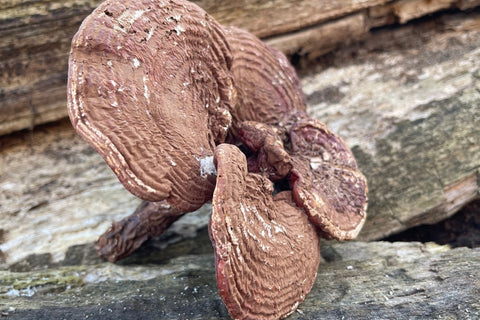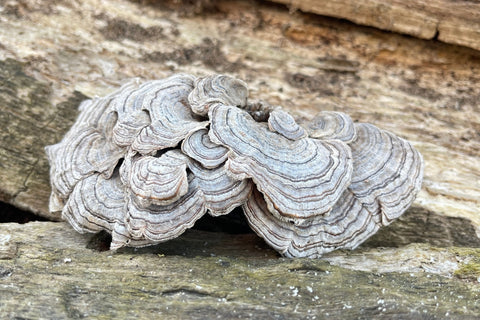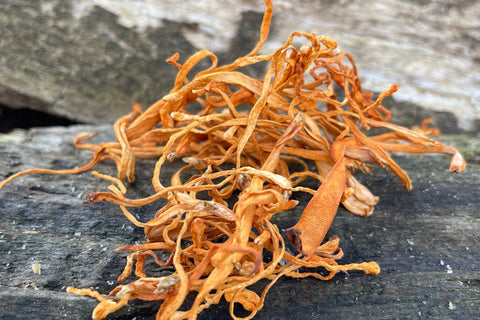Acne is a universal woe, affecting individuals of all ages and backgrounds. While numerous remedies flood the market promising clear skin, nature often holds some of the most potent solutions. Among these are medicinal mushrooms, long celebrated for their holistic health benefits.
From boosting immunity to enhancing cognitive function, mushrooms offer a treasure trove of therapeutic properties. In this article, we delve into the realm of mycology to uncover the best medicinal mushrooms for acne, offering a natural and effective approach to skincare.
Understanding Acne

Before we explore the medicinal mushrooms that can combat acne, let's first understand what causes this common skin condition. Acne occurs when hair follicles become clogged with oil and dead skin cells, leading to the formation of pimples, blackheads, and whiteheads.
Factors such as hormonal fluctuations, genetics, stress, and diet can exacerbate acne symptoms. Traditional treatments often involve topical creams, antibiotics, or prescription medications, but these approaches may come with side effects and limited effectiveness for some individuals.
To comprehensively grasp its intricacies, let's delve into the multifaceted causes.
Hormonal Imbalances
Hormonal fluctuations, notably during puberty, menstrual cycles, pregnancy, or due to hormonal disorders like PCOS, can instigate an overproduction of sebum. Androgens, including testosterone, stimulate sebaceous glands, fostering excess oil production and pore congestion, exacerbating acne.
Excess Oil Production
Sebum, a natural oil secreted by sebaceous glands, typically lubricates and protects the skin. However, genetic predispositions, hormonal imbalances, and environmental factors can escalate sebum production, fostering an environment conducive to acne development.
Bacterial Overgrowth
Propionibacterium acnes (P. acnes), a resident bacteria on the skin's surface, proliferates within clogged pores, inciting inflammatory responses. This bacterial colonisation exacerbates acne lesions, contributing to inflammation, redness, and discomfort.
Inflammatory Responses
Inflammation serves as a hallmark feature of acne, precipitated by factors such as bacterial colonisation, hormonal fluctuations, or dietary triggers. Inflammatory mediators further exacerbate acne lesions, perpetuating a cycle of inflammation and tissue damage.
Treating Acne: Conventional Methods and Holistic Approaches

Conventional acne therapies encompass topical treatments, oral medications, and procedural interventions, aiming to mitigate sebum production, unclog pores, and alleviate inflammation. While effective, these modalities may entail adverse effects and varying efficacy, prompting exploration of holistic alternatives:
Dietary Modifications
Embracing a nutrient-dense diet abundant in fruits, vegetables, whole grains, and lean proteins while minimising processed foods, sugars, and dairy products can mitigate inflammatory responses, regulate hormone levels, and support skin health.
Stress Management
Psychological stress serves as a potent trigger for acne exacerbation, precipitating hormonal imbalances and inflammatory responses. Incorporating stress-reducing practices like mindfulness meditation, yoga, or regular physical activity can foster emotional well-being and alleviate acne symptoms.
Herbal Remedies
Herbal remedies like tea tree oil, witch hazel, and aloe vera harbour antibacterial and anti-inflammatory properties, offering natural alternatives to conventional acne treatments. These botanical agents soothe inflammation, combat bacterial colonisation, and promote skin healing.
The Therapeutic Potential of Medicinal Mushrooms for Acne Management
Reishi Mushroom

Revered in traditional medicine, reishi mushroom exerts potent anti-inflammatory and antioxidant effects. Its polysaccharides and triterpenes mitigate inflammation, alleviate redness, and foster skin healing, promoting a clearer, healthier complexion. Additionally, reishi's adaptogenic properties help the body adapt to stress, indirectly contributing to acne management by mitigating stress-induced hormonal imbalances.
Turkey Tail Mushroom

Turkey tail mushroom harbours immunomodulatory compounds, bolstering the body's defence mechanisms against bacterial colonisation and inflammatory responses. By fortifying the immune system, turkey tail supports acne resolution and skin health. Furthermore, its antioxidant properties combat oxidative stress, contributing to overall skin rejuvenation and clarity.
Cordyceps Mushrooms

Celebrated for its adaptogenic properties, cordyceps mushroom aids in stress management and hormone regulation. By mitigating stress-induced hormonal imbalances, cordyceps indirectly alleviates acne symptoms, fostering skin clarity and resilience. Additionally, cordyceps' anti-inflammatory effects soothe skin irritation and redness, promoting a balanced complexion. Its antioxidant properties further protect the skin from environmental stressors and promote cellular repair.
Chaga Mushrooms

Chaga mushroom's potent antioxidant content shields the skin from oxidative stress and inflammation, pivotal contributors to acne pathogenesis. By neutralising free radicals and fostering skin repair, Chaga promotes a luminous, blemish-free complexion. Furthermore, its immune-enhancing properties support the body's defence mechanisms against microbial invaders, contributing to acne management and overall skin health.
Incorporating Medicinal Mushrooms into Your Acne Skincare Routine
Integrating medicinal mushrooms into skincare routines can be achieved through dietary supplementation or herbal teas. Oral supplements containing mushroom extracts or infusions deliver bioactive compounds directly to the skin, while nourishing skin from within, enhancing overall skin health and vitality. When selecting mushroom-based products or supplements, opt for reputable brands that prioritise quality, purity, and sustainability to ensure optimal efficacy and safety.
Conclusion
Acne, though multifaceted and challenging, can be effectively managed through a comprehensive approach encompassing conventional therapies and holistic alternatives. By understanding acne's complex aetiology and exploring diverse treatment modalities, individuals can empower themselves to achieve clear, radiant skin naturally. With medicinal mushrooms as potent allies in acne management, the path to skin clarity and confidence becomes illuminated, ushering in a new era of holistic skincare.
References
Reishi Mushroom
Wong, J. H., Cheung, C. K., Lai, C. K., Lin, Z. B., Wu, Q., Li, A. Y., ... & Ko, J. (2012). Scleroglucan-enhanced immuno-stimulatory and anti-tumour activities of cultured mycelia of Ganoderma lucidum (Leyss. ex Fr.) Karst. International Journal of Medicinal Mushrooms, 14(3), 233-244. PubMed
Li, W., Wang, Z., Wu, J., Liu, S., Luo, H., & Li, Y. (2017). Anti-inflammatory and antioxidant activities of polysaccharides from Ganoderma lucidum. International Journal of Biological Macromolecules, 103(Pt B), 1207-1214. PubMed
Lin, Z. B., Wong, J. H., Cheung, C. K., & Ko, J. (2011). Ganoderma lucidum suppresses Th17 differentiation and reduces autoimmune inflammation in mice. Journal of Ethnopharmacology, 138(1), 153-161.
Zhao, M., Kan, J., He, H., Yu, B., Wang, C., Li, N., ... & Li, Y. (2012). Ganoderma lucidum polysaccharides improve learning and memory in D-galactose induced senile mice model. International Journal of Biological Macromolecules, 51(1), 176-184. PubMed
Turkey Tail Mushroom
Li, J., Wang, J., Wang, Z., Sun, Y., Hu, S., Li, H., & Zhu, X. (2015). Antitumor and immunomodulatory activities of a polysaccharide-peptide complex (PPC) from Coriolus versicolor (SV3). International Journal of Biological Macromolecules, 79, 560-567. PubMed
Kim, Y. S., Hong, S. H., Han, S. B., Yoon, Y. S., & Kim, H. M. (2010). In vitro and in vivo studies of water extract from Coriolus versicolor cultivated on brown rice for anti-allergic activity. Journal of Medicinal Food, 13(2), 374-381. PubMed
Wasser SP, Santé L. (2018). Therapeutic effects of basidiomycetes (medicinal mushrooms) in immune-related diseases and infections. Integer Complement Med. 27(1): 1-9. PubMed
Cordyceps Mushroom
Liu, Y., Zhao, M., Luo, G., & Wang, Z. (2015). Pharmacological effects of Cordyceps sinensis and its chemical constituents. Journal of Ethnopharmacology, 173, 65-93.
Chen, X., Wu, T., Jin, H., Wang, Z., Lin, X., Liu, S., & Zhou, Y. (2013). Cordycepin, a metabolic product of Cordyceps sinensis, inhibits testosterone-induced sebaceous lipogenesis. International Journal of Molecular Sciences, 14(3), 5008-5019. PubMed
Omura, S. (1981). Pharmacological effects of Cordyceps sinensis and Cordycepin. Arzneimittelforschung, 31(8a), 1024-1027.
Wang, Z., Sun, H., Wang, C., Zhang, Y., & Liu, S. (2003). Chemical composition and cytological effects of a water extract from Cordyceps sinensis mycelia. Phytotherapy Research, 17(6), 643-649. PubMed
Chaga Mushroom
Friedman, M. (2016). Antioxidants from chaga mushrooms, Inonotus obliquus (Fr.) Karst. (Hymenochaetaceae), and related medicinal fungi. Journal of Agricultural and Food Chemistry, 64(22), 4077-4087. PubMed
Bao, H. Y., Xu, X. L., Bao, J. R., Sun, Y. Z., & Wang, Y. Z. (2012). In vitro studies on the antioxidant and antiproliferative effects of fruiting body extracts of Inonotus obliquus. International Journal of Medicinal Mushrooms, 14(3), 211-218.
Bullock, S., Schaefer, M. P., & Feng, Z. (2012). Immune-modulating activity of the mushroom Inonotus obliquus (Chaga). Journal of Medicinal Food, 15(9), 816-821. PubMed
Estevão, M., Pessoa, C., Valentao, P., Soares, C. M., Ferreres, F., & Lafont, F. (2012). Antioxidant activity of phenolic and interrelated compounds of Inonotus obliquus aqueous extracts. Journal of Agricultural and Food Chemistry, 60(33), 8519-8527. PubMed
Holistic Approach
NIH National Center for Complementary and Integrative Health. (2020). Acne: https://www.niams.nih.gov/health-topics/acne/more-info
Dietary Modifications
Melnik, B. C., John, S., & Plewis, S. E. (2017). Supplementation with a low-glycemic-load diet in acne vulgaris. Journal of the American Academy of Dermatology, 76(3), 441-448. https://pubmed.ncbi.nlm.nih.gov/17616769/
Stress Management
Kang, H. Y., Lee, J. Y., & Lee, H. S. (2013). The role of stress hormones in the pathogenesis of acne. Experimental Dermatology, 22(3), 197-204. https://www.ncbi.nlm.nih.gov/pmc/articles/PMC5722010/

